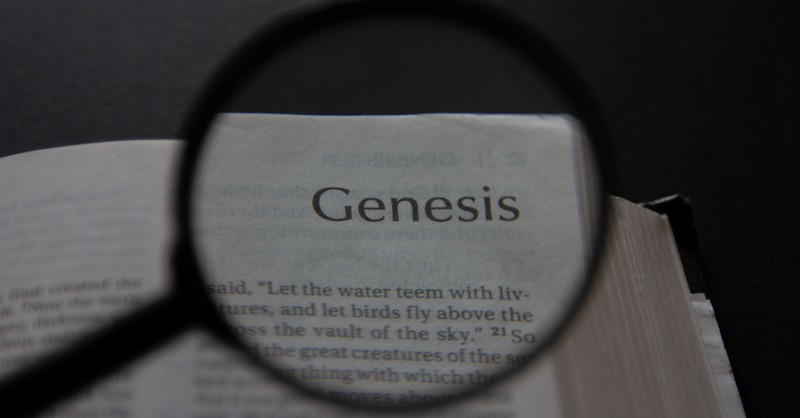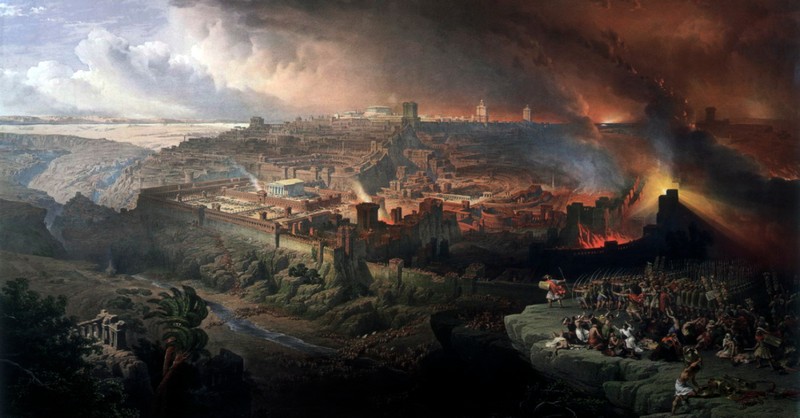
Then the Lord rained down burning sulfur on Sodom and Gomorrah—from the Lord out of the heavens. Thus he overthrew those cities and the entire plain, destroying all those living in the cities—and also the vegetation in the land. – Genesis 19:24-25
This is the end of Sodom and Gomorrah—the moment when God executed judgment on them and the surrounding cities. But how did we get there?
In getting to this end, you will discover what I will call some inconvenient truths about Sodom and Gomorrah. The truths are inconvenient because we don’t want to acknowledge them or simply because, sometimes, we forget them. However, it's important that we take the time to study these truths in the Bible.
In the Bible, the beauty of the Scriptures is that God gives you truth...sometimes it feels good, and sometimes it doesn’t. As they say in church, sometimes you say ‘amen,’ and if you can’t say ‘amen,’ say ‘ouch.’
The story of Sodom and Gomorrah is filled with those types of moments.
Photo Credit: ©Getty Images/nikkytok

The Background of Sodom and Gomorrah
You cannot look at the story of Sodom and Gomorrah without considering Lot, who was Abraham’s nephew. He is really the person in the story you root for.
Because of his connection to Abraham and because you like Abraham, you tend to root for Lot.
However, what you see in Lot is a series of bad decisions that become the foundation for these inconvenient truths.
Sodom and Gomorrah in the Bible was defined by one word…wicked.
Now the people of Sodom were wicked and were sinning greatly against the Lord. – Genesis 13:13
Despite the wickedness of the city, for some reason Lot was drawn to live near this city which leads us to the first of four inconvenient truths in this biblical account:
Truth #1: You can’t decide to live near sin and think it won’t affect you.
Abram lived in the land of Canaan, while Lot lived among the cities of the plain and pitched his tents near Sodom – Genesis 13:12
Lot pitched his tents near Sodom. Notice he did not live in the city but was somewhere outside the city. Yet the influence of Sodom would soon impact Lot’s life. In the New Testament Paul reminds us:
Do not be misled: “Bad company corrupts good character.” – 1 Corinthians 15:33
This is exactly what happened to Lot. If you fast forward in this story, notice where the angels find Lot when they go to rescue him.
The two angels arrived at Sodom in the evening, and Lot was sitting in the gateway of the city. When he saw them, he got up to meet them and bowed down with his face to the ground. – Genesis 19:1
Lot was no longer outside the city or near the city, he was sitting in the gateway of the city. This was no small thing. It was an indication that he was a leader in the city.
Lot went from being an outsider to being a leader in a city where the people sinned greatly against God. Clearly, he either disregarded or participated in the depravity of this city. Either way, the influence of sin either seared his conscience (so he no longer saw sin in the same way) or it allowed him to be a participant.
The lesson here for you and I is: if you hang around sin long enough it can become normalized. When this happens, what should be appalling and repulsive reaches the point of being acceptable.
What’s fascinating about Lot’s story is that he had the opportunity to choose where he wanted to go and he chose to live near the people of Sodom. How could he think that the influence of the city would not come near him and impact him?
The same is true for us.
We should never be so foolish to think that we can pitch our tents near bad influences all the time and they will have no effect. Lot made this bad decision, and too often, many Christians make the same bad choice. If I could say it in one thought, anything that is constantly around you will eventually impact you.
So be wise where you pitch your tent.
Photo Credit: ©SparrowStock

What Do We Know about Lot, Who Lived in Sodom and Gomorrah?
Truth #2: Lot was just as depraved as everyone else in Sodom.
I know we don’t often think of Lot in these terms. After all, he is Abraham’s nephew. But Lot was just as depraved as the people of Sodom. Consider this discourse in Genesis which shows you his depravity.
Before they had gone to bed, all the men from every part of the city of Sodom—both young and old—surrounded the house. They called to Lot, “Where are the men who came to you tonight? Bring them out to us so that we can have sex with them.” Lot went outside to meet them and shut the door behind him and said, “No, my friends. Don’t do this wicked thing. Look, I have two daughters who have never slept with a man. Let me bring them out to you, and you can do what you like with them. But don’t do anything to these men, for they have come under the protection of my roof.” – Genesis 19:4-8
I am a father of two children, one boy and one girl. There is no way I am offering my daughter to any man or group of men to have their way with her. You would literally have to kill me first.
However, this is what Lot did.
This shows you the depravity of his mind and how he had been impacted by living in Sodom. Lot was not saved because he was a righteous man. He was saved because God was merciful to Abraham.
If anything this should remind you to never stop praying for those wayward family members, because God hears those prayers.
Photo Credit: ©Getty Images/Gearstd

Truth #3: God’s grace does have an expiration date.
Then the Lord said, “The outcry against Sodom and Gomorrah is so great and their sin so grievous – Genesis 18:20
Because of the sin happening in the city, God had to respond. If there are words to describe God the first ones that come to mind are usually loving, gracious, merciful, and kind. In fact, Paul tells us:
Or do you show contempt for the riches of his kindness, forbearance and patience, not realizing that God’s kindness is intended to lead you to repentance? – Romans 2:4
Yet as merciful, patient, and gracious as God is—there is a point where God’s grace has an expiration date. This is what happened in Sodom.
While we’re not sure of the exact population, we know Sodom and Gomorrah were part of five cities that made up the plain of Jordan in this area. Regardless of the size of those cities, here is a stunning truth about Sodom and Gomorrah. The Bible lets us know there weren’t even 10 righteous people in the entire city. God promised Abraham he would not destroy the city if there were 10 righteous people in the city.
Then he said, “May the Lord not be angry, but let me speak just once more. What if only ten can be found there?” He answered, “For the sake of ten, I will not destroy it.” – Genesis 18:32
Well, we know what happened. This speaks to the great depravity and wickedness that existed in this city. Not only were they not righteous, they sinned greatly against God. The wickedness of Sodom and Gomorrah made it impossible for God to extend any further grace towards this city.
We must be very careful not to take the grace of God for granted. God is still the final judge. For those who choose not to repent (like Sodom and Gomorrah), there will come a day when God’s grace towards you will expire and you will have to pay the price for your sin.
Photo Credit: ©Wikipedia - Public Domain

What Does Sodom and Gomorrah Teach Us about the Prosperity Gospel?
Truth #4: Prosperity is not always a sign that God is pleased.
Lot looked around and saw that the whole plain of the Jordan toward Zoar was well watered, like the garden of the Lord, like the land of Egypt. (This was before the Lord destroyed Sodom and Gomorrah.) – Genesis 13:11
When you live in a farming and herding community, you want well-watered plains. This is a sign of fertile land, useful for growing crops and herding cattle. In other words, this is a land that is flowing with the potential for great prosperity. This is a land that is prime for overflow.
However, this land (as fertile as it was), was also a prime candidate for the judgment of God.
Too often in our world, we equate economic or financial success with God’s blessing, or as an indication that God is pleased with our lives. While in a sense, economic or financial success is a blessing from God—it is by no means an indication that God is pleased with your life.
This is probably one of the hardest and most inconvenient truths from Sodom and Gomorrah. The Bible says:
He causes his sun to rise on the evil and the good, and sends rain on the righteous and the unrighteous. – Matthew 5:45
Let’s not be so callous as to think that our bank accounts, and what we have, are evidence that God is with us and for us. It simply is not true. This is true of individuals, families—even nations.
God’s favor and blessing will always rest on those who honor God and do what he desires. This may not be a pleasant truth to some, but it is the truth, nonetheless.
Conclusions from Sodom and Gomorrah
How do you sum up the inconvenient truths of Sodom and Gomorrah? The Bible gives us the answer in one of my favorite verses:
Keep this Book of the Law always on your lips; meditate on it day and night, so that you may be careful to do everything written in it. Then you will be prosperous and successful. – Joshua 1:8
Love God. Love his word. Do what it says. If you do that you will never see or experience the hand of judgment like the people of Sodom and Gomorrah.
Photo Credit: ©Getty Images/Smileus
Originally published Saturday, 31 October 2020.




